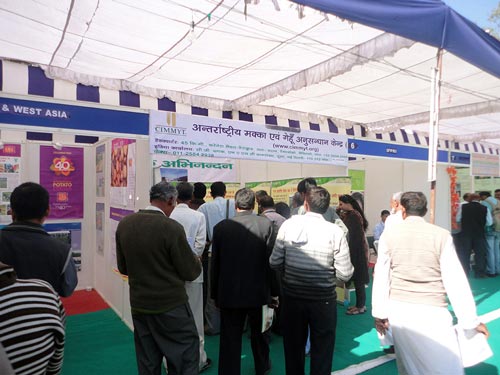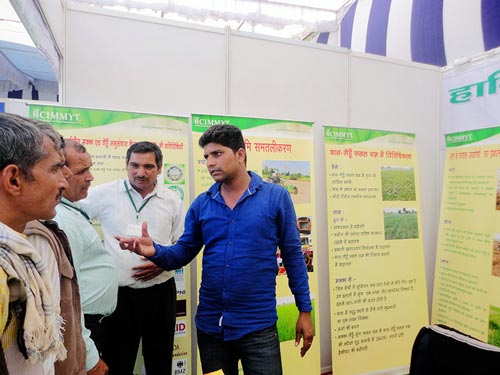 Pusa Krishi Vigyan Mela, a farmers’ fair organized by the Indian Agricultural Research Institute (IARI) annually since 1972, was held during 6-8 March 2013 in New Delhi, India. Every year, agriculture institutes and universities gather at the fair to disseminate their upgraded technology through exhibitions. This year, the focus was on “Agricultural technologies for farmers’ prosperity” and for the very first time IARI invited CGIAR centers, including CIMMYT, to display their technological innovation and experience.
Pusa Krishi Vigyan Mela, a farmers’ fair organized by the Indian Agricultural Research Institute (IARI) annually since 1972, was held during 6-8 March 2013 in New Delhi, India. Every year, agriculture institutes and universities gather at the fair to disseminate their upgraded technology through exhibitions. This year, the focus was on “Agricultural technologies for farmers’ prosperity” and for the very first time IARI invited CGIAR centers, including CIMMYT, to display their technological innovation and experience.
CIMMYT took the opportunity to raise awareness on conservation agriculture technologies and receive feedback from farmers and agricultural scientists. The CIMMYT team consisted of B.R. Kamboj, Dalip Kumar, and Er. Kapil Singla who were accompanied by Anil Bana (Haryana) and supported by scientists and colleagues from CIMMYT-Delhi. They demonstrated conservation agriculture technologies and throughout the three days interacted with thousands of people, mainly farmers (both men and women), researcher, and scientists, but also school children who came to learn from the exhibition.
On inauguration day, Sharad Pawar, Union Minister for Agriculture and Food Processing Industries, Government of India, strongly emphasized the importance and need to develop new farm technologies to ensure food and nutritional security in the country and to enhance farm profitability and overall agricultural development. The visiting farmers showed keen interest in conservation agriculture and asked for conservation agriculture literature published in the local language to be distributed among farmers. According to the farmers, more follow-up sessions with the government’s extension workers are needed for better uptake of new technologies.
 The socioeconomics team of CIMMYT India (Mamta Mehar and Subash Ghimire) also joined the fair to interact with farmers and learn about their perspectives on new technologies and farming-related constraints. Although the farmers came from different states, they mentioned having several common problems: the unavailability of quality seeds and other input on time, weather uncertainty, unpredictability of rainfall, and temperature variability. Farmers from Haryana and Rajasthan also talked about increasing pollution, degrading soil quality, and emergence of new type of insects and pests for which they would like to seek solutions. They were concerned about limited access to knowledge and low awareness on new technologies, especially those that help to manage climate change related risks. The socioeconomics team also learned that farmers are aware that using more than the advised amount of fertilizers and pesticides may harm the soil, but they do so anyways because they are afraid of the appearance of insects, pests, etc. as a result of unforeseen weather changes.
The socioeconomics team of CIMMYT India (Mamta Mehar and Subash Ghimire) also joined the fair to interact with farmers and learn about their perspectives on new technologies and farming-related constraints. Although the farmers came from different states, they mentioned having several common problems: the unavailability of quality seeds and other input on time, weather uncertainty, unpredictability of rainfall, and temperature variability. Farmers from Haryana and Rajasthan also talked about increasing pollution, degrading soil quality, and emergence of new type of insects and pests for which they would like to seek solutions. They were concerned about limited access to knowledge and low awareness on new technologies, especially those that help to manage climate change related risks. The socioeconomics team also learned that farmers are aware that using more than the advised amount of fertilizers and pesticides may harm the soil, but they do so anyways because they are afraid of the appearance of insects, pests, etc. as a result of unforeseen weather changes.
The interactions with farmers were particularly useful, as they motivated the socioeconomics team to ensure the CCAFS project researches coping mechanisms that would allow farmers to manage climate variability risks. CIMMYT-India hopes to go back to Pusa Krishi Vigyan Mela next year to gain more valuable knowledge directly from Indian farmers.
 Climate adaptation and mitigation
Climate adaptation and mitigation 
